In front of Supreme Court, a nation divided on abortion drug
Published in Political News
WASHINGTON — Hours before the U.S. Supreme Court heard oral arguments in a major abortion case, advocates on either side of the debate began preparing for what they see as the most consequential court case since Dobbs vs. Jackson Women’s Health Organization, which ended the national right to an abortion.
Police informally estimated that about 600 to 700 individuals gathered outside the Supreme Court in the lead-up to oral arguments in a challenge to the Food and Drug Administration’s regulation of mifepristone, a drug used in medication abortions.
First Street Northeast, which separates the Capitol from the Supreme Court, was blocked to road traffic, and a diverse but predominantly female crowd chanted, marched and blared music in support of and against abortion rights.
Abortion opponents gathered to the right of the steps, while abortion rights supporters mostly clustered to the left of the steps. Lily Allen’s song “F— You,” often used in protests, began blasting on loop at 10 a.m.
Earlier, Capitol Police said they had arrested 13 people on the Capitol grounds for allegedly blocking roads and a walkway ahead of the arguments. But most of the protests were peaceful, with some advocates traveling thousands of miles to witness the scene Tuesday.
The occasion attracted a colorful crowd. One woman dressed in a hooded robe held up a sign that read “The Grim Reaper loves the abortion pill.” Another individual dressed as Abe Lincoln held a tongue-in-cheek sign stating “Let the men decide.”
Abortion opponents
At least two women outside the Supreme Court used their own pregnancies to deliver a message.
Savannah Evans of Florida, who works for the anti-abortion group Live Action, said she arrived at 7:30 a.m.
“I do not want my child to grow up in a world that thinks that abortion is a woman’s right,” said Evans, who said she is nine months pregnant. The phrase “Human Too’ was written on her visible stomach. She said she was disappointed she and a friend had been unable to engage with protesters from the other side.
Melanie Salazar, executive director of Pro-Life San Francisco, who is 31 weeks pregnant, had the message “Fully Human” written on her belly. She said she was part of a group of about 10 from Progressive Anti-Abortion Uprising who had traveled to be in front of the court.
“I’ve been feeling my baby move for months, and my baby is equally human like me,” she said. “Any disruption to the abortion industrial complex, like a pro life-win in this case, is a win for the pro-life movement, a win towards protection and conception in all 50 states.”
A group of 11 Texas residents, including eight from Amarillo, shared a more local message. Speaking together, they said they had come to support Judge Matthew J. Kacsmaryk of the U.S. District Court for the Northern District of Texas. Kacsmaryk issued the initial district court ruling in the case.
The group held signs with quotes from Kacsmaryk, saying the local judge’s opinion resonates with them. They said they support Amarillo becoming a sanctuary city for life and preventing abortion trafficking.
Anna Pilato, director of federal public policy for the Christian Medical & Dental Associations, which is part of the Alliance for Hippocratic Medicine, said the outcome of the case will determine what society’s values are in a speech to a crowd outside the court Tuesday.
“I am so shocked by the FDA’s callous actions in systematically removing safety standards for chemical abortion drugs. How can they remove these standards and distribute these high-risk drugs without the safety protocols,” said Pilato, a former Department of Health and Human Services official during the Trump administration.
Abortion rights
On the left, advocates emphasized the drug’s safety.
Mira Michels, a former researcher and now volunteer with Aid Access, said she came to the protests Tuesday to prove mifepristone’s safety. She demonstrated the group’s Roe-bots, moving robots that can dispense the drug in states with what are known as telemedicine abortion shield laws.
Michels, who said she is not pregnant, swallowed a dose of mifepristone as part of her demonstration to show it would not cause ill effects.
“We are here because we want people to know that abortion is safe. It should be legal and should continue to be legal, but if it becomes illegal, it does not matter. We will be here,” she said.
J.J. Straight, the national campaigns director for reproductive rights for the ACLU, arrived around 3:45 a.m. to reserve space and set up for the day.
Straight said a multi-organization effort between groups that support abortion rights had buses arriving in the morning, with individuals coming from Ohio, Pennsylvania, North Carolina and West Virginia to participate.
Ryan Stitzlein, vice president of political and government relations for Reproductive Freedom for All, said the possibility that the case could affect abortion access for all 50 states was important to voters, particularly in places with state-level protections like New York, California and Michigan.
“We’re gonna do all we can to make sure that we reelect President Biden, but we also need to deliver a pro-reproductive freedom Congress that can actually pass protections,” Stitzlein said. “This case threatens their access to abortion care, and so people need to be paying attention. They need to be paying attention to who’s elected at the federal level, and that’s why the stakes have never been higher in this next election.”
©2024 CQ-Roll Call, Inc. Visit at rollcall.com. Distributed by Tribune Content Agency, LLC.







Comments